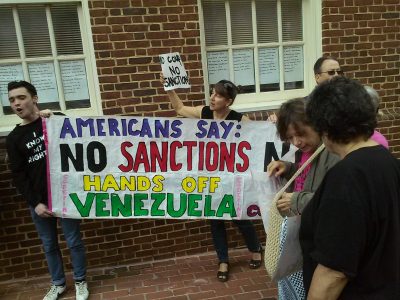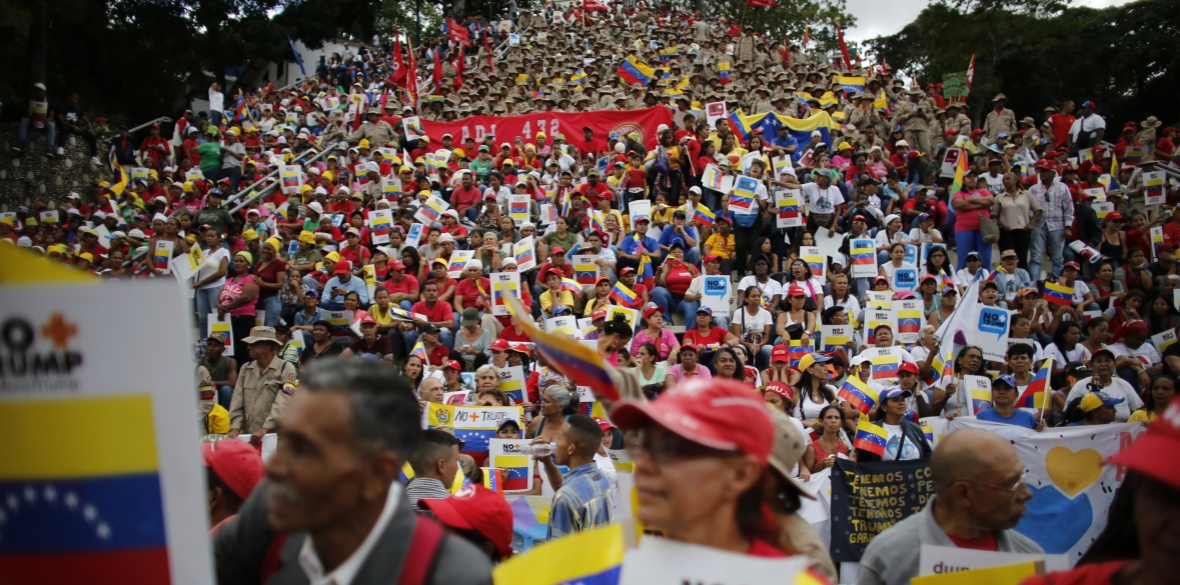13 Million Expected to Sign Petition Against US’s Venezuela Blockade

As many as 13 million people are expected to sign a petition opposing the US economic blockade of Venezuela and the “genocidal, racist, xenophobe” Donald Trump, according to the Bolivarian government.
Tables have been organised in public squares in cities across Venezuela gathering names for the petition, which will be sent to United Nations secretary general Antonio Guterres.
Venezuelan President Nicolas Maduro and his wife Cilia Flores were the first to sign the petition at the No More Trump rally in Caracas on Saturday.
He said:
“This is a fight for peace against the sanctions imposed by the United States, and the power of the dollar … For 20 years Venezuela has had a popular government. Today, we Venezuelans have dignity and are spiritually united.”
The national drive was launched yesterday and will last until September 10.
Millions signed a similar petition in February when a US-backed coup attempt was launched by president of the illegitimate national assembly Juan Guaido.
He declared himself interim president of Venezuela. But his attempts at launching armed insurrection have failed, with the army and the people of Venezuela remaining loyal to Mr Maduro.
The failure to garner internal support is believed to be behind the executive order signed by US President Donald Trump on August 5 freezing Venezuelan state assets in the US.
The latest measures amount to a near-total blockade and were branded a “criminal act” by Mr Maduro at the Caracas rally.

Government supporters gather for a rally to protest against economic sanctions imposed by the administration of US President Donald Trump, in Caracas, Venezuela, on Saturday (Source: Morning Star)
Sanctions are estimated to have caused 40,000 deaths between 2017 and 2018, according to the Washington-based Centre for Economic & Political Research.
Its report published in April found that Venezuelans were deprived of “lifesaving medicines, medical equipment, food and other essential imports” due to the US embargo.
The non-aligned movement (Nam) has discussed measures to counter the impact of US global sanctions, with 21 countries now included on Washington’s sanctions list.
A gathering of 120 Nam countries met in Caracas last month, issuing a statement that affirmed that only Venezuela can decide its fate. It warned that US sanctions were in breach of the United Nations charter.
The meeting agreed to develop an international financial system independent of US control. President of the general assembly Maria Fernanda Espinosa told those gathered that the Nam was an important strategic partner for the UN, making up two thirds of its total membership — and 55 percent of the world’s population.
“Multilateralism and international law are the only effective formula to achieve a sustainable and lasting peace,” she said.
*
Note to readers: please click the share buttons above or below. Forward this article to your email lists. Crosspost on your blog site, internet forums. etc.
Featured image is from Embassy Protection Collective

